Behind the News
Behind the News: All the backstories to our major news this week
Published
3 weeks agoon
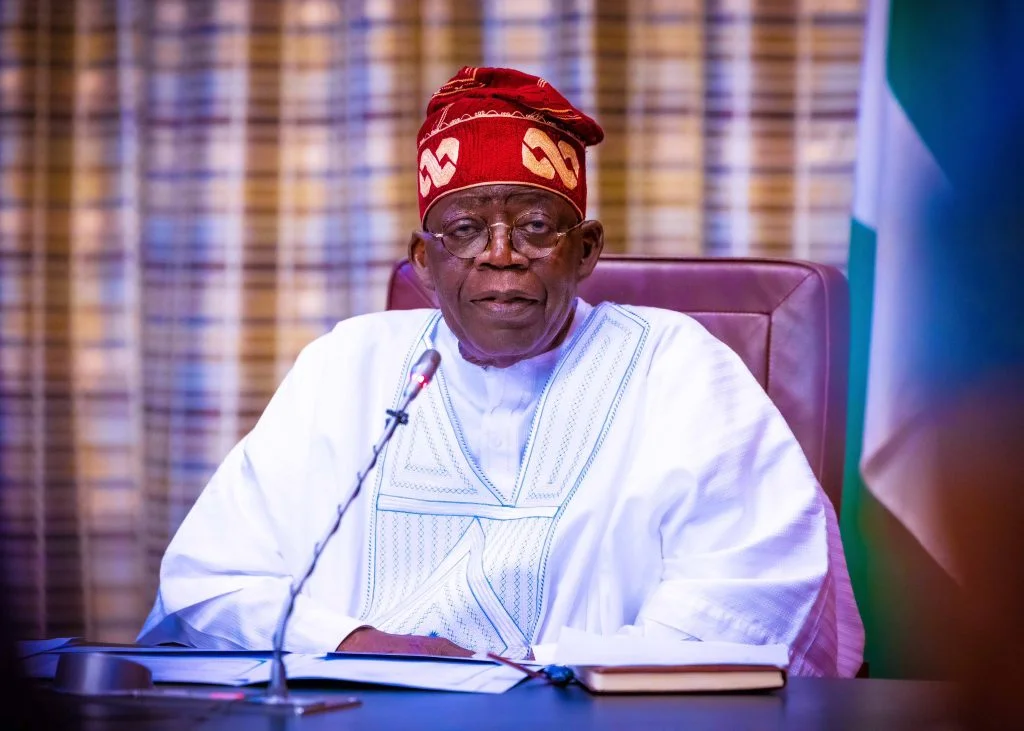
Over the past week, there were lots of important stories from around the African continent, and we served you some of the most topical ones.
Here is a rundown of the backstories to some of the biggest news in Africa that we covered during the week:
1. Renewed Hope: Tinubu’s regular sing-song and the sad reality of Nigeria
During the week in review, Nigeria’s President Bola Tinubu was once again at his rhetorical best when he pronounced the all the tough policy decisions and reforms he has undertaken since coming into office almost a year are have been in the best interest of Nigerians and the good of the country.
Tinubu who spoke during a bilateral business session with Dutch Prime Minister Mark Rutte at the Hague in the Netherlands, said every of his decisions were taken with the interest of his fellow citizens at heart.
He reiterated that his policies which have caused pains and anguish for Nigerians were in their best interest.
“I am a determined leader of my people. I am ever ready to take tough decisions in the best interest of the people, even if with initial pains,” Tinubu said.
“I have and will continue to take the difficult decisions that will benefit our people, even if there is short-term pain,” he added.
But beyond the regular promises of better days ahead by Tinubu and his team, the reality on ground in the country does not seem to align with so much optimism.
The first sign that things were going to be tough was when Tinubu pronounced the end of fuel subsidy in his inaugural address to the nation on May 29, 2023, without as much of a plan to ameliorate the anticipated economic crisis that was to follow.
Despite later attempts to provide some succour and buffers to cushion the effects of the subsidy removal, things have gone from bad to worse with the cost of living rising through the roof.
Inflation has gone up to an all time high of 30.20% according to the Nigeria Bureau of Statistics while prices of basic goods have gone beyond the reach of the average Nigerians, many who find it difficult to provide for their families.
But to President Tinubu, the pains and hardship Nigerians are currently going through will soon be a thing of the past because, according to him, his “tough policies” would yield positive results in the end.
“We have gone through the worst of the storms. I am unafraid of the consequences once I know that my actions are in the best long-term interests of all Nigerians,” he posited.
Nigerians are indeed waiting patiently for the fulfilment of these promises and are looking forward to a time they will go back to living a normal life again!
2. Discriminatory Chinese supermarket meets its match as Nigerian govt shuts mall
A Chinese supermarket located in the heart of Abuja, Nigeria’s capital, ran into hot water when the Federal Competition and Consumer Protection Commission (FCCPC), shut it down following allegations of discrimination against Nigerian shoppers.
Before the action of the government agency, a report had indicted that the supermarket located within the premises of the China General Chamber of Commerce in Abuja, was in the habit of barring Nigerian citizens from shopping in the mall.
Following the exposè which came with video evidence and investigations carried out by the FCCPC turned out to be true, officials of the agency promptly moved in and shut down the mall.
Director for Surveillance and Investigation of FCCPC, Boladale Adeyinka, who led the team, said they took the action was in response to a viral video showing Nigerians being discriminated against and not being able to get into an Abuja supermarket.
“The essence of the surveillance and investigation that we conducted today is to verify the allegations and the content of that viral video,” she told journalists during the exercise.
That was not the first time foreign business ventures have discriminated against Africans in their own country by refusing them their services.
A few years ago, a Chinese restaurant in Lagos was in the news for refusing to serve a Nigerian couple and it took the intervention of the state government for normalcy to return to the outfit after some Nigerian youth decided to vent their anger on the eatery.
Many Chinese, Lebanese and other companies run by foreigners in Nigeria have been found to discriminate against their Nigerian staff and customers but as usual, the powers that be have always turned a blind eye to such allegations, largely because the business owners have their plugs in the right places while the victims are always at the lower rung of the society.
3. Runaway Binance executive reportedly nabbed in Kenya
It was reportedly a bad day in the office for an executive director of global cryptocurrency firm, Binance Holdings Limited, Nadeem Anjarwalla, who had escaped from lawful detention in Nigeria, as he was arrested in Kenya.
Anjarwalla, a British-Kenyan citizen was arrested on arrival in Nigeria on February 26, along with another Binance official, Tigran Gambaryan, on allegations of tax evasion, money laundering and other charges.
But on March 22, Anjarwalla made an audacious escape from a guest house where he and Gambaryan were being held and was promptly declared wanted with the Nigerian authorities engaging the services of Interpol to help track him down.
The manhunt for Anjarwalla was ended when he was arrested in his hideout by a combination of Kenyan police and operatives of the Interpol.
The Kenya Police Service, in a statement confirming the arrest of the fugitive, said the fleeing Binance executive was arrested in “conjunction with the International Criminal Police Organisation (Interpol) and moves were being perfected for his extradition to Nigeria.
But beyond the arrest of Anjarwalla and the embarrassment it caused the country’s security agencies, a lot of questions have arisen from the episode.
Many Nigerians have continued to wonder how he managed to escape from the so-called safe house he and his colleague were being held.
How could Anjarwalla stage such an escape without the active connivance of some security officials who must have had their palms greased?
How did he manage to get a replacement passport to leave the country since his original passport had been seized by the Economic and Financial Crimes Commission upon his arrest?
Questions, and more questions have continued to rise and Nigerians are waiting for answers, if they will come at all.
4. Zambian CSO blames media polarisation for biased reportage
The Executive Director of a Zambian civil society organisation, Chama Mwansa, has blamed the polarisation of the media for biased coverage and reportage in the country.
Mwansa who is the ED of the Chandarika Women and Youths Foundation, in an interview with Zambia Monitor, said the media was balkanized between private and state-owned media outlets which has led to a bias in news coverage.
“The media plays a crucial role in society. Media freedom allows for comprehensive coverage of various perspectives, whether from the opposition or the ruling party,” she said in the interview.
She also harped on the importance of media freedom, freedom of speech, and digital rights in promoting social and economic development, and emphasized on the importance of media partnerships in facilitating coverage of events.
Mwansa’s observations on the polarisation of the media industry in her country can also be replicated in many African countries where the media is gagged and practitioners are made to look like the dregs of the society.
In many African countries, journalists are seen as dangerous species with many of them treated with disdain. Many journalists in different parts of the continent have been abducted, brutalized and killed for just doing their jobs which have constantly raised the question on the safety and freedom of journalists.
5. Al Ahly, Esperance in clash of titans for CAF Champions League trophy
For the fourth straight seasons, two of Africa’s most successful clubsides, Al Ahly of Egypt and Esperance of Tunisia, will clash in the final of the TotalEnergies CAF Champions League scheduled for next month.
Al Ahly which is the current holders of the title and their long-standing rivals Esperance, booked their places in the final in dramatic fashions to earn their places in the final of Africa’s epic football tournament.
Al Ahly cruised past former champions TP Mazembe of the DRC 3-0 in their two-legged semi final tie, while Esperance defeated another former winner, Mamelodi Sundowns of South Africa, running out with a 2-0 aggregate victory.
Al Ahly, winners of the five of the last seven editions of the CAF Champions League, will be aiming for her 12 trophy when they visit Esperance for the first leg in Rades on May 18, while the Tunisian giants will be gunning for a fifth Champions League title, which clearly puts the two teams as the best in the continent.
The second leg will hold in Cairo a week later, which, on paper, gives Ahly a sense of home advantage.
- But however it turns out, there will surely be fireworks as the two teams battle for the glory in the two-legged final and surely, whichever team comes out tops will be the best for the African continent.
You may like
-


Nigeria targets 10,000MW hydropower through sustainable power project
-
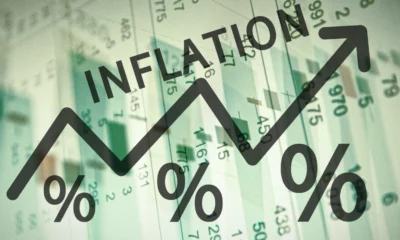

Nigeria’s inflation hits 28-year high of 33.69% in April
-


Nigeria: President Tinubu unveils 21 major initiatives
-


Nigeria: Govt approves SPV for 90,000km fibre optic cable
-


Shell investigates smoke at Gbaran oil plant in Nigeria
-


Nigeria’s Petroleum Regulator begins bidding round for 12 oil blocks
Behind the News
Behind the News: All the backstories to our major news this week
Published
4 days agoon
May 12, 2024
Over the past week, there were lots of important stories from around the African continent, and we served you some of the most topical ones.
Here is a rundown of the backstories to some of the biggest news in Africa that we covered during the week:
1. Stop wailing, they are for your good, Nigerian govt defends Tinubu’s multiple
taxes
Despite the hues and cries of Nigerians over multiple taxes imposed on citizens by the President Bola Tinubu’s administration since coming into office almost a year ago, government officials have continued to defend the so-called reforms.
The latest to do so is Vice President Kashim Shettima who said the multiple taxes are a “necessary evil” aimed at revitalising the economy and not to frustrate Nigerians.
Shettima who spoke at a close-out retreat of the Presidential Fiscal Policy and Tax Reforms Committee set up by Tinubu, said “contrary to speculations in some quarters, the reforms will benefit the country in the long run.”
He stated that fears nursed by citizens over the tax reforms being implemented by the Tinubu administration, are targeted at revitalizing the country’s economy and not to frustrate and further impoverish Nigerians.
“We are not here to frustrate any sector of our economy but to create an administrative system that ensures the benefits of a thriving tax system for all our citizens.
“Our aim remains the revitalisation of revenue generation in Nigeria while sustaining an investment-friendly and globally competitive business environment,” the VP said.
This has been the usual rhetoric by government officials who are not adversely affected by the hardship and hunger being experienced by ordinary people in the past one year of Tinubu’s “bold reforms”.
From the removal of fuel subsidy without provision for ameliorating the expected fallout, to the tight grip on monetary policy, to the multiple taxation which has led to skyrocketing inflation and high cost of living, ordinary Nigerians have been made to bear the brunt of government policies.
Like Senate Chief Whip, Ali Ndume argued, it is inhuman for the government to continue taxing Nigerians without increasing their income.
2. Edgar Lungu still Zambia authorities’ nightmare
Despite being out of office for over two years, former Zambian President, Edgar Lungu remains one of the biggest nightmares of the Hakainde Hichilema administration.
Every move made by Lungu is viewed with suspicion by the government and its agencies and being the smart alec, Lungu has often played them to his advantage.
So it was last week Thursday when the ex-President caused a stir when he decided to take a walk around the Lusaka’s Central Business District which turned into a rowdy scene as traders and residents chanted and cheered his name, while motorists honked in solidarity as he strolled through the area.
Lungu was also warmly welcomed at Lusaka’s biggest trading marketplace, Soweto, as he waved at the traders, and motorist while assessing the cost of living and engaging with traders.
The actions and increased popularity of the former President must have sent the security agencies into panic mode as they did everything to douse the tension, coupled with the fact that the government had since banned such public procession.
There were reports that the National Police had suspended six officers who refused to prevent Lungu from embarking on the march due to its potential of causing a breach of public peace.
But in a swift reaction aimed at further dousing tensions, Police Public Relations Officer, Rae Hamoonga, said contrary to the allegations, no police officer had been suspended on the said allegations.
“Our investigation has revealed that such an incident did not occur, and therefore, no disciplinary action has been taken against any officers in connection with this matter,” Hamoonga said.
The Zambian government has done virtually everything within its powers to clip Lungu’s wings as the country gears up for a general election next year but it seems the more they try, the more the ex-President is becoming more popular.
It is left to be seen the next line of action from the administration to put Edgar Lungu in check.
3. Success has many relations; the intriguing story of Ademola Lookman
Before accepting to Switch allegiance from England to Nigeria, Ademola Lookman had rejected the country of his father three times with the hopes of playing for the Three Lions.
Former Super Eagles coach, Genort Rhor extended invitation to Lookman on two occasions but he turned them down.
Amaju Pinnick, used his position as the then Nigeria Football Federation (NFF) President, to personally court the striker through his parents but he still refused to accept an invitation to play for Nigeria.
In his final rejection of Nigeria in 2018, Lookman, sounding frustrated, said in an interview:
“I’ve not changed my mind on wanting to represent England.”
But after waiting in vain for a call up from England manager, Gareth Southgate, Lookman did the sensible thing by requesting a change of allegiance from FIFA and
February 10, 2022, his request to represent the Nigerian national team was approved by the world football governing body.
Lookman made his debut for Nigeria on March 25, 2022, in their scoreless draw with Ghana as part of the third round of the African section of qualification for the 2022 FIFA World Cup and went on to give a five-star performance at the 2023 Africa Cup of Nations held in the Ivory Coast where he scored three goals for Nigeria.
The rest, as they say, is history as the 25-year-old is now one of the most loved players both in Nigeria and in Italy where he plies his trade with Atalanta.
Such is the great love his fans have for Lookman that an Italian couple named their new born baby after him after leading the modest team into the final of the Europa League.
The Super Eagles forward gained the namesake after he scored a spectacular goal against Olympic Marseille of France in the Europa League semifinal second leg match to take Atalanta to the final.
According to reports from EuroFoot on X, Ademola’s performance was recognised by the couple who live in Palosco, a district in Bergamo where the Italian club is based.
“Somebody named their child after Ademola Lookman following his goal which helped send the Italian club to the Europa League final!” EuroFoot wrote.
The story of Lookman’s metamorphosis can only be compared to a man who has his palm kernel cracked for him by the gods.
4. Idriss Deby: From Army khaki to civilian president
During the week in review, Chadian interim president, Mahamat Idriss Deby, became another military junta leader who easily transformed into a civilian president after he was declared declared winner of the country’s disputed election held on May 6.
The State Electoral Commission of Chad announced that Deby, who succeeded his father who was killed in an army uprising in 2021, had secured an absolute victory in the presidential election, receiving more than 61% of the votes according to provisional figures
Deby was declared winner despite the main opposition candidate claiming victory for himself.
His “victory” at the presidential poll meant that
Chad, like in many African countries, has moved from a military regime back to constitutional governance through democratic elections, but with the same man on the saddle.
Though the election was marred by pockets of violence and discontent by the opposition who cited electoral manipulation, Deby has joined continental leaders who transitioned from military leaders to civilian leaders.
5. Count us out, Nigerian govt denies bribery allegation by Binance CEO
Attempts by the CEO of cryptocurrency exchange giant, Binance, Richard Teng, to rope in some government officials in a $150m bribe aimed settle the ongoing criminal charge filed against the firm has been vehemently denied by the Nigerian government.
Teng, in an article he write for the New York Times, had alleged that unknown government officials had made the bribe demand to Binance officials shortly after they held a meeting with Nigerian lawmakers on January 8.
In the article, Teng accused the individuals whom he failed to identify, of acting on behalf of government officials to demand $150m in cryptocurrency to resolve the tax evasion and money laundering case against the company and its officials.
“They demanded a significant payment in cryptocurrency to be paid in secret within 48 hours to make the issues go away,” Teng wrote in the article.
But in a swift reaction on Wednesday, Nigeria’s Minister of Information and National Orientation, Mohammed Idris, denied the allegations,
describing them as blackmail aimed at tarnishing the image of the country.
“The allegations are baseless and part of a wider attempt by Binance to evade accountability for alleged criminal activities,” Idris said.
“This claim by Binance CEO lacks an iota of substance. It is nothing but a diversionary tactic and an attempted act of blackmail by a company desperate to obfuscate the grievous criminal charges it is facing in Nigeria,” Idris said.
“They lack any evidence and are merely a diversionary tactic employed by Binance to deflect attention from the serious charges it faces in the country.”
Despite Idris’s strong denial of Teng’s allegations, questions are still being asked how one of the detained Binance officials, Nadeem Anjarwalla managed to escape from custody and flee from Nigeria?
Was his escape part of the alleged bribe scheme? Was there an exchange of money that paved the way for Anjarwalla’s escape from Nigeria?
How was he able to secure an alternative passport when his original passport had been seized by the EFCC?
Questions and more questions keep arising from the Binance-gate while Nigerians wait for answers which may never come.
Behind the News
Behind the News: All the backstories to our major news this week
Published
2 weeks agoon
May 5, 2024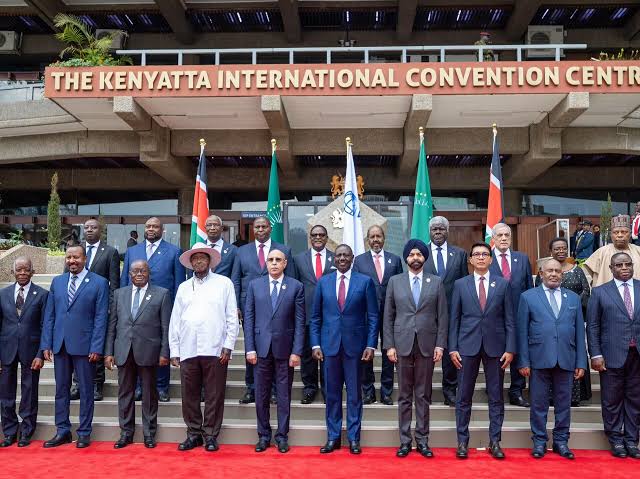
Over the past week, there were many important stories from around the African continent, and we served you some of the most topical ones.
Here is a rundown of the backstories to some of the biggest news stories in Africa that we covered during the week:
Different takes as African leaders spotlight multilateral loans
The call for a reform in the financial instrument of multilateral bodies like the International Monetary Fund (IMF) and the World was at the front burner in the week as African leaders on Monday called for rich countries to commit to record contributions to a low-interest World Bank facility for developing nations. The leaders stressed that most African countries depend on the fund to sponsor development and combat climate change.
Kenya’s President William Ruto told a meeting of African leaders and the World Bank to discuss IDA funding, “call on our partners to meet us at this historic moment of solidarity and respond effectively by increasing their IDA contributions… to at least $120 billion.”
Ruto has been a notable voice in the call. Last year, during a session at the Paris Climate Summit, he called for a new global financial architecture outside the present creditor system which according to him tilts in favour of lenders like the IMF and the World Bank.
“We need a financial consumption tax at a global level that countries like Kenya pay, we do not want anything for free, we will pay more eventually because we have a bigger economy. We want those resources controlled not by IMF and World Bank because IMF and World Bank have the final say…,” Ruto said.
The World Bank has maintained that IDA lends money to 75 poor countries around the world at low-interest rates. More than half of these countries are in Africa. Governments use the money to improve access to healthcare and energy, put money into farms, and build important things like roads.
But Ugandan President, Yoweri Museveni, expressed a fresh perspective to the discourse at the same event as he urged African leaders to verify the true intentions of multilateral lending institutions towards the continent. He asked African leaders to “audit the intentions of the World Bank loans to ensure that they are for prosperity rather than profiteering”. He added: “What loans are we getting as Africa? Is the World Bank giving us loans for private sector-led growth or to be more dependent?”
“Our populations are increasing, but our economies are stunted. The International Development Association (IDA) should tell us why they are funding the modern slavery of Africans, and we should address issues like why Africa is producing what it does not consume and consuming what it does not produce”, the Ugandan leader stated.
Interventions by multilateral bodies have remained controversial in some cycles although the bodies have claimed that poverty reduction is one of their objectives, but some studies have shown that IMF borrower countries experience higher rates of poverty. A 2022 research by Glen Biglaiser and Ronald J. McGauvran which investigated the effects of IMF loan conditions on poverty using a sample of 81 developing countries from 1986 to 2016, found that IMF loan arrangements containing structural reforms contribute to more people getting trapped in the poverty cycle, as the reforms involve deep and comprehensive changes that tend to raise unemployment, lower government revenue, increase costs of basic services, and restructure tax collection, pensions, and social security programmes.
Liberia enacts war crimes court; who should follow?
Liberia’s President Joseph Boakai has signed an executive order to establish a war crimes court. Boakai granted his final approval and congratulated the lawmakers for their effort in the legislation. A special court was eventually ordered to be established to try those who were deemed to be at fault by the Truth and Reconciliation Committee.
Many atrocities, such as rape, massacres, and the use of child soldiers, occurred during the wars that lasted from 1989 to 2003. In their fight against rebels affiliated with the Liberians United for Reconciliation and Democracy (LURD), government forces in Liberia have been accused of war crimes as well as grave violations of human rights, such as the widespread rape of women and girls, the summary execution of numerous civilians, and the looting and burning of entire villages.
Without warning or predetermined protocol, hundreds of civilians were allegedly arbitrarily and forcibly conscripted and deployed to fight on the front lines, frequently with little to no military training. The LURD troops have also been alleged to have committed grave crimes such as rape, forced recruitment of civilians, including child soldiers, and summary killings of suspected government collaborators.
Activists and civil society organizations that have demanded greater justice for crimes committed during the conflicts that claimed the lives of almost 250,000 people have praised the initiative. Some in Liberia are against its development, arguing that it could weaken the amnesty law that was already in place and cause old grievances to resurface. This helped put a stop to the violence.
Most African countries have a shared history of civil wars and internal crises that have made calls for special courts to try war popular in the continent. Nigeria, Rwanda, Ethiopia, Sudan, Congo DR have recorded thousands of deaths of civilians occurring in separate conflicts of armed groups. Some of those killings are also categorized as war crimes and crimes against humanity, with most cases unsolved and consequential agitations in cases for self-determination and secession by aggrieved section of the state, which account for the volatile nature of most African states.
Liberia’s template which has birthed a special war crimes court might be a direction to follow in states with these experiences, first to afford victims closure through justice and likely deterrent for likely war crime offenders but much still lies on the political will of the state to ensure justice despite the special court.
Scrabble for Niger as US accuses Russia over military base incursion
Despite remaining under military reign and retaining consequent pariah status in the international community, West African country, Niger Republic, appears to remain a toast for world powers as the United States and Russia had their latest confrontation over the country during the week. Russian military personnel have reportedly made their way into an American military air base in Niger, according to a senior US defence official cited by Reuters. This move follows the junta in Niger’s decision to expel American personnel.
Until a coup last year, the country had been a vital ally for Washington’s fight against insurgents who had killed hundreds of people and displaced millions more. Mali, Libya, Chad, the Central African Republic, and other nations on the continent have looked to Russia for security cooperation. Russian paramilitary soldiers have now landed in Niger, isolating the United States and compelling its 1,100 military personnel to leave the country for the next few months.
America will lose access to a vital military facility it needs to combat terrorist organizations like ISIS as a result of Russia’s increasing influence in Niger. To strike terrorist bases in the area, intelligence gathered from the U.S. drone base in Niger is crucial. In what global politics observers have labelled a “failed strategy” Cameron Hudson, a former intelligence officer for Africa at the CIA, referring to countries with coup governments in Africa noted that “when all of these countries kicked out the French and turned inward, we then tried to pivot to become the peacemaker in the hopes that we could keep our presence there.” “All of that is not working. We are now out. Russia is now in.”
According to US law, Washington is not allowed to give money to coup regimes like the one in Niger. However, in an attempt to eventually restore military and other financial support, American leaders have made an effort to retain diplomatic ties with those nations, many of which have abundant natural resources.
A few African leaders have praised Moscow’s participation, arguing that in situations where the United States is unable to offer prompt security support, Moscow can. Some have resisted American efforts for reform, arguing that the West has no right to preach democracy in Africa when it ignores comparable problems with its friends elsewhere in the world.
On Africa and long-distance race at the Olympic
Ahead of the 2024 Summer Olympic Games in Paris, France, Athletics Kenya named their six-man team on Wednesday. The team consists of three men and three women, with one reserve on each side. The team is led by Hellen Obiri, Benson Kipruto, and Eliud Kipchoge, the reigning champions. A “killer squad” the team has been called by sports enthusiasts giving the track record of the East African country at long-distance races. Kenyan and regional neighbours Ethiopian athletes have dominated the middle- and long-distance sports since the 1968 Mexico City Olympics. They have also shown a similar level of dominance in international cross-country and road racing competitions.
Benson Kipruto, the winner of the Tokyo Marathon, and Alexander Mutiso, the winner of the London Marathon, are both picked in the final Kenyan Olympic team. Timothy Kiplagat, the runner-up in Tokyo, will be backup in case any of the three chosen athletes are unable to compete. As she travels to Paris in fine form, having set a new women’s only world record last month by winning the London Marathon, Jepchirchir will have an opportunity to defend her championship with the final team list.
Their success has attracted significant attention on a global scale and has been the focus of social, sporting, and even scholarly studies. Genetic predisposition, development of high maximal oxygen consumption as a result of extensive walking and running at an early age, and comparatively high haemoglobin and hematocrit were some of the factors identified by Randall L. Wilber and Yannis Pitsiladis.
Developing a good metabolic “economy/efficiency” based on somatotype and lower limb characteristics, having an advantageous oxidative enzyme profile and skeletal-muscle-fiber composition, living and training at altitude, following a traditional Kenyan/Ethiopian diet, and having the drive to succeed economically are additional factors. However, although the variety of physiological and anatomical explanations appear tenable for the dominance, no definitive advantage has been found through research as athletes from other parts of the world like Asia and North America with little or no features peculiar to East Africa have had considerable success in long-distance also.
East Africa will continue counting its medals with pride while the search continues.
EDITOR’S PICK


Google relaunches Hustle Academy with AI focus to empower African SMBs
Google has relaunched the 2024 cohort of its Hustle Academy, a programme dedicated to accelerating the growth of small and...
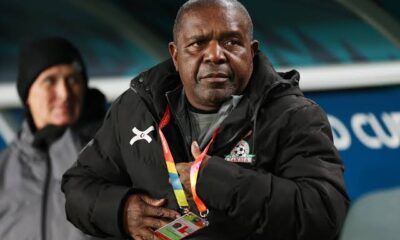

Zambia’s women national team coach face new sexual assault allegation
Zambia women national team coach, Bruce Mwape, is facing new allegations of sexual assault and misconduct at the 2023 Women’s...


China’s Hailiang, Shinzoom to establish vehicle battery installations in Morocco
Hailiang and Shinzoom, Chinese car battery makers, will establish two separate operations in Morocco as the country strives to adapt...


Nigeria targets 10,000MW hydropower through sustainable power project
Nigeria’s Minister of Power, Adebayo Adelabu, says the federal government is targeting10,000 megawatts through its Sustainable Power and Irrigation Project...


Nigeria’s inflation hits 28-year high of 33.69% in April
Nigeria’s consumer inflation reached a 28-year high of 33.69% in April, up from 33.20% in March, according to statistics agency...
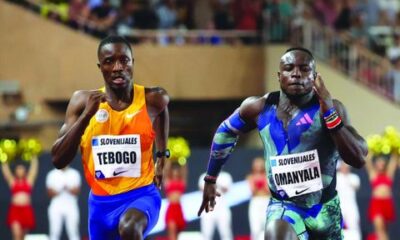

Botswanan Tebogo hits at Kenyan Omanyala over claims of being African sprint king
Botswanan sprint sensation, Letsile Tebogo, has hit back at Kenyan 100m champion, Ferdinand Omanyala, over claims that he is the...


Latin America’s biggest payment processor PayRetailers expands into Africa
Latin America’s biggest payment processor, PayRetailers, has announced its expansion into Africa with coverage across four countries, Rwanda, Zambia, Uganda,...


Legendary American music icon Stevie Wonder becomes full Ghanaian citizen
Legendary American singer and songwriter, Stevie Wonder, is now officially a Ghanaian citizen after he took an oath of allegiance...


Zambian opposition New Heritage Party accuses govt of dictatorship
One of Zambian opposition parties, the New Heritage Party (NHP), has accused the government of dictatorship after the police insisted...


Nigeria: President Tinubu unveils 21 major initiatives
Nigeria’s President Bola Tinubu has unveiled 21 major policy initiatives of his administration after the Federal Executive Council (FEC) meeting...
Trending
-

 VenturesNow2 days ago
VenturesNow2 days agoShell investigates smoke at Gbaran oil plant in Nigeria
-

 Tech1 day ago
Tech1 day agoLatin America’s biggest payment processor PayRetailers expands into Africa
-

 Sports1 day ago
Sports1 day agoBotswanan Tebogo hits at Kenyan Omanyala over claims of being African sprint king
-

 VenturesNow16 hours ago
VenturesNow16 hours agoNigeria’s inflation hits 28-year high of 33.69% in April


